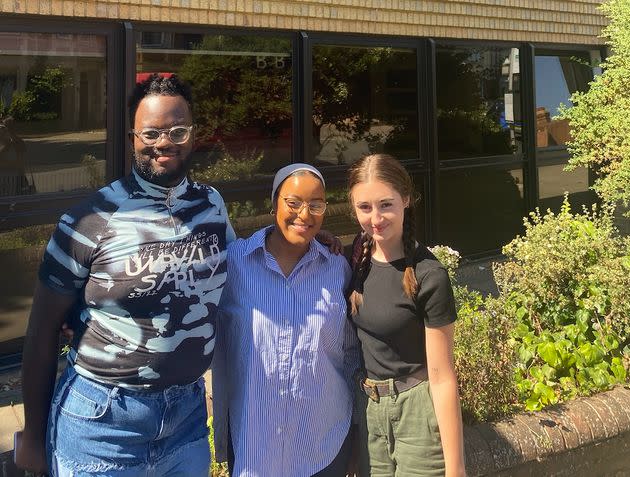These Students Want To Make Domestic Abuse Lessons Compulsory In Sixth Form

Left to right: Darius Smith, Ithar Ghalifa and Pippa Campbell, who are all working on the campaign. (Photo: Faustine Petron)
More than 60,000 people have signed a petition to make lessons on domestic abuse compulsory in sixth forms and colleagues across the UK, thanks to campaigning from a group of students. Now, the charity Refuge has backed the idea.
Faustine Petron, a university student from Oxford, started the campaign group Teach DV and the initiative ‘Make it Mandatory’ alongside her friends this summer. The 22-year-old experienced abuse and harassment as a teenager.
“I was in an abusive relationship for three years,” she tells HuffPost UK.
“When I moved to university and started a new chapter in my life in a place where I knew no one, I had a lot of time to reflect on what happened to me and how I left school and college totally unprepared for the word of dating or being aware of red flags.
“I realised that the lack of education I had made me more vulnerable to the situation I found myself in and I started this campaign because I wanted others to benefit from the education I never had.”

Faustine Petron (Photo: Faustine Petron)
Teaching on domestic violence is included in the Relationships and Sex Education curriculum, but the campaign group point out that compulsory classes cover Key Stage 4 (years 7-11), meaning emphasis trails off just as older students may need the information most.
New research from the charity Refuge, which is now backing Petron’s campaign, suggests that for younger students, these lessons are sometimes skipped by schools.
Only half (50%) of young people surveyed said they had received education on domestic abuse and controlling or coercive behaviour during years 7 – 11 of secondary school, despite this being mandatory since 2020.
The number of 16-19 year olds who said they had received or were due to receive this education at their sixth form or further education college fell to less than half (47%).
“Sixth form and college aged students 16-19 are of an age to get into relationships and they need to be ready for life after sixth form and everything to come such as university,” says Petron.
“If they aren’t aware of the red flags they are more likely to find themselves in dangerous and abusive situations.”
Since launching their petition, Petron and her friends have contacted MPs, schools, newspapers and anyone who’ll listen to find support. They’ve been overwhelmed by the reaction.
“I remember meeting my local MP Layla Moran when I was at maybe 900-1000 signatures and feeling pretty stuck because my local council weren’t engaging with me and all the other MPs I contacted ignored my emails and calls for advice,” says Petron. “Two weeks later we were at over 40,000 signatures!
“I remember waking up and checking my phone and almost choking on my Weetabix out of shock! Comments of support from survivors, parents and teachers really touch me and make me realise that although it is difficult campaigning for something that I am so closely linked to, it is always worth it.”
🎉 Congratulations to @TeachDV for reaching over 50,000 signatures on your petition. I have written to @OxfordshireCC and @educationgovuk asking them to support this campaign.
👇 Sign and share to help this campaign reach 75,000 signatureshttps://t.co/Evvm6anTFy— Layla Moran 🔶 (@LaylaMoran) August 10, 2022
The group say there’s cause for urgency around implementing these lessons as incidences of domestic violence are on the up.
The number of domestic violence crimes recorded by the police in England and Wales increased by 6% in 2021 – from 798,607 in March 2020 to 845,734 in March 2021. And in 2020, there were also 24,856 offences of coercive control recorded by the police in England and Wales, according to ONS.
Refuge’s CEO Ruth Davison and Petron have now written to the new Secretary of State for Education, Kit Malthouse MP, asking him to consider how more consistent education on domestic abuse can be achieved.
“Sixth forms and colleges have a duty of care to protect their students of all gender identities and backgrounds from falling into the vicious cycle of perpetrating or receiving abuse,” says Petron.
She points to a study by Refuge from 2017, which found one in three young people said they found it difficult to define the line between a caring action and a controlling one. Additionally, a third (37%) of young people would not know where, or who, to turn to for support if they were experiencing abuse.
In response to the petition, a spokesperson for the Department for Education said: “Domestic violence is a horrific crime. To help children and young people learn about healthy relationships early on we have made Relationship, Sex, and Health Education (RSHE) lessons in schools compulsory.
“Schools and post-16 providers should also be alert to issues such as everyday sexism, misogyny, and gender stereotypes and take positive action to build a culture where these are not tolerated, and any occurrences are identified and tackled.”
Though it’s unclear if extra lessons about domestic abuse will be rolled out, Petron is hopeful they’ll make a big difference to young people’s lives.“I hope these lessons teach students from all backgrounds and gender identities how to recognise signs of domestic abuse whether that be emotional , physical, sexual or financial as it’s important to remember domestic abuse is an umbrella term and covers so much more than physical or emotional,” she says.
“I know from personal experience that spotting red flags early on in a relationship would have made me leave my ex partner earlier and before things got so dangerous and out of hand.”
Help and support:
If you, or someone you know, is in immediate danger, call 999 and ask for the police. If you are not in immediate danger, you can contact:
The Freephone 24 hour National Domestic Violence Helpline, run by Refuge: 0808 2000 247
In Scotland, contact Scotland’s 24 hour Domestic Abuse and Forced Marriage Helpline: 0800 027 1234
In Northern Ireland, contact the 24 hour Domestic & Sexual Violence Helpline: 0808 802 1414
In Wales, contact the 24 hour Life Fear Free Helpline on 0808 80 10 800.
National LGBT+ Domestic Abuse Helpline: 0800 999 5428
Men’s Advice Line: 0808 801 0327
Respect helpline (for anyone worried about their own behaviour): 0808 802 0321
This article originally appeared on HuffPost UK and has been updated.

 Yahoo Movies
Yahoo Movies 